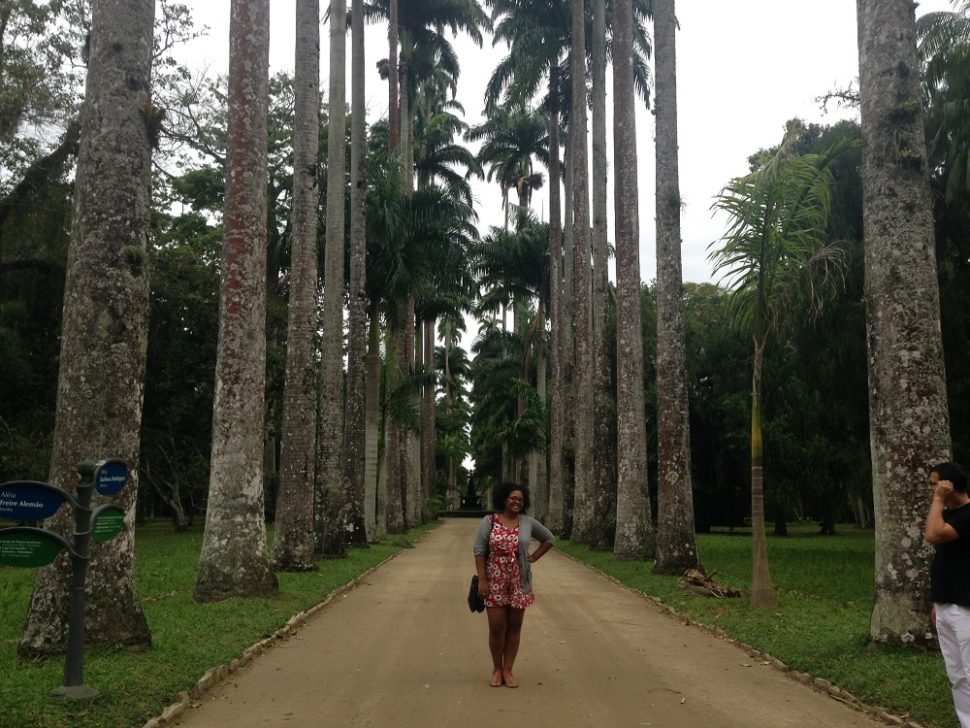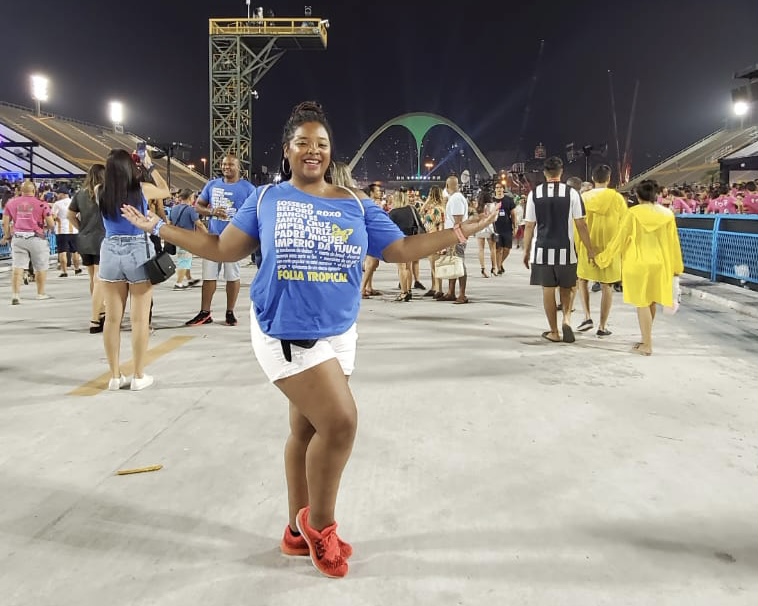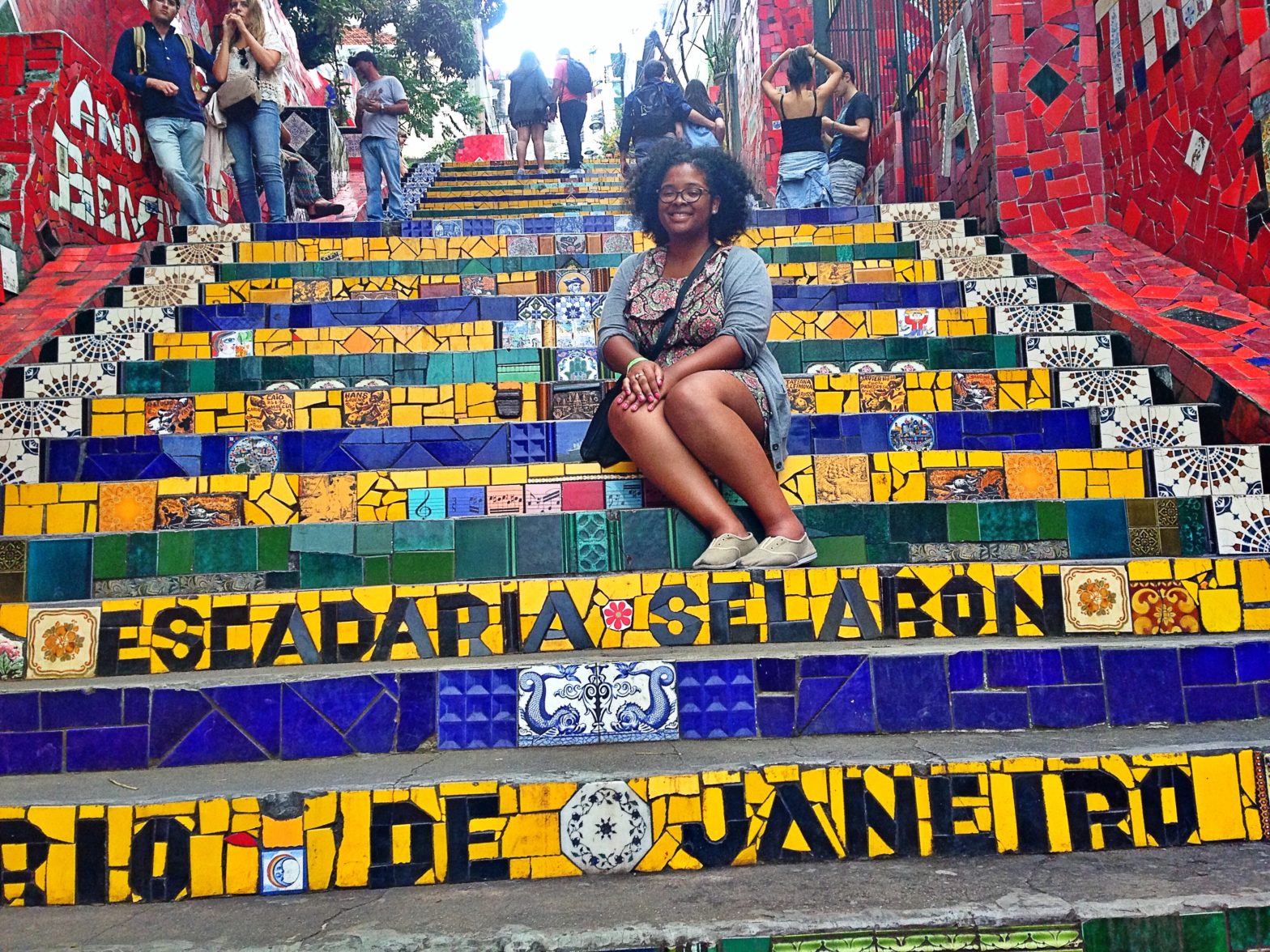Sophia Buxton is a 34-year-old New York City native, and proud HBCU graduate, currently living in Brazil. She works as an Operations and Strategy expert through her company Yemayá Consulting.
After years of traveling and exploring countries in Europe, Africa and South America, Buxton has now planted roots in Rio de Janeiro, Brazil, where she’s going to spend the next few months. Although this New Yorker feel in love with Rio for many reasons, one thing outweighs the others: her love of Samba music, which helped her cope with the loss of her father.
“I began dancing samba in 2019 as a stress reliever while caring for my terminally ill father,” she told Travel Noire.
Buxton shared her more on her experience as a Black woman living solo in Rio and what she loves about being in Brazil.

Travel Noire: How often do you typically travel?
Sophia Buxton: Before the pandemic, I enjoyed traveling as much as my budget allowed. Some of my most memorable trips were exploring Kenya, seeing the Northern lights in Norway, hiking to Machu Picchu, and Brazil—the country that stole my heart.
I consider myself a late bloomer to travel compared to my peers. I got my first passport in my late 20s and didn’t take my first international trip until a few years later. However, since then, I’ve been very intentional about where I travel. As a Black-American, Afro-Latina, I purposely pick destinations where the African diaspora is found. My ancestors traveled all over the world, where they’ve made communities and built nations. There’s power in those stories of resistance. So when I visit a country, I want to see and connect with my people. Language may be a barrier, but when I see another person with a similar skin tone or features, I always feel connected.

TN: What led you to Brazil the first time?
Sophia Buxton : I can’t remember how I heard about Brazil for the first time, but for some reason, I have always been drawn to her. I spent much of my late 20s doing spiritual and emotional work. Even though the work is never done, it was during that time that I realized that I was done playing small in life and not taking enough risks. To challenge me, I booked my first solo trip to Rio in September 2015. When I booked the trip, so many friends and family feared for my life. One of the few people who encouraged me was my cousin Jessica and close friend Ashley. They both had traveled solo to dozens of countries and knew that this was the experience I needed to push my life forward.
I panicked for about 15 minutes once I landed in Rio because I didn’t know the language or what I was going to do. It turned out to be the best time of my life. I stayed at a hostel, made long-term Brazilian friends, and fell in love with myself even more. I never felt so independent or powerful in my life. As soon as I landed in NYC, I knew I wanted to return so I began taking Portuguese classes.
TN: Can you tell us more about your love for Samba Music?
Sophia Buxton : I think it’s fascinating, the life of a passista (a samba no pé dancer for a samba school. I began dancing samba no pé in 2019 as a stress reliever while caring for my terminally ill father. The history of samba is rooted in resistance, and that is a theme that resonated deeply with me as caretaker. Samba touched me on a spiritual level and gave me strength and joy that I couldn’t cultivate on my own.
When my father passed in September 2019, I returned to Rio de Janeiro, for Carnaval 2020. I paraded with Imperio Serrano on a float and took samba classes with my idols. At that point I knew I wanted to parade again but this time as a passista. These men and women deserve all the respect in the world. They train endlessly while maintaining jobs, their families, and life in general. When you see a passista you see strength, joy, and of course resistance. They inspire me and while I don’t think I can ever truly earn the title of passista, I aspire to be like them.

TN: Why did you decide to relocate to Rio for a few months?
Sophia Buxton : As the pandemic continued, I was fortunate to land a spot in Alex Coutinho and Ale Jensen’s weekly courses. They are well-respected professionals in the Carnaval community and have been offering 4-5 classes a day, every day, since April 2020.
I’ve been dancing weekly with them since July 2020, and it’s been the most challenging and rewarding experience. My samba technique and historical knowledge have improved immensely. Thanks to the dedication of Alex and Ale, a community called the Poderosas do Samba has been formed. We are hundreds of women all over the world who are committed to “Samba com verdade” with respect, pride. This community made the pandemic bearable, and I developed lifelong friendships. Alex and Ale truly changed my life.
I decided that I wanted to relocate, so I can connect with the Cubango community while I continue to refine my samba knowledge and skills. I’ve learned a lot virtually, but there’s nothing like hearing and dancing with the bateria live and in person!
I acknowledge that this trip presents challenges due to COVID-19 and plan to take every precaution possible.
TN: What do you like most about Brazil?
Sophia Buxton : Brazil, and Rio in particular, are not without their issues. But what country/city isn’t? Since my first trip, I’ve returned 2 more times to visit São Paulo, Salvador, and back to Rio for Carnival. Each visit, I’ve fallen more and more in love with how welcoming Brazilians are. It’s what I love most.
In my experience, they always want to share their culture with you and learn about yours. Upon my return, I couldn’t stop talking about my experience and begging Black Americans, in particular, to visit. I think we have a very different experience when in Brazil because there’s a shared identity that includes ancestry, culture, slavery, and oppression. It’s hard to put into words, but it’s like we see each other as similar despite nationality. I’ve always felt embraced and welcomed in Brazil, and long to visit each time I leave. I do acknowledge that my experience is different since I am an American tourist with some privileges, and I am mindful of that each time I visit.

TN:Can you speak Portuguese?
Sophia Buxton : Sim, falo um pouco de português, mas entendo mais quando leio (Yes, I can speak Portuguese, but I understand more when I read it). I’m more confident reading and writing, too. I want to be fluent. I hope to practice a lot in Rio de Janerio over the next three months. Thanks to my Portuguese teacher and friend, Taisa. During the pandemic and now, we have classes every week.
TN:What do you hope to learn by living this season in Brazil as an African-American woman?
Sophia Buxton : Great question. My main goal is to continue to grow emotionally and spiritually as a Black woman while building a community of my own in Brazil. Ironically, thanks to the pandemic, I’ve made countless connections virtually with the samba community. I want to continue to honor all those who paved the way on the sacred samba soil for us. Samba in a lot of ways saved my life, and I am dedicated to preserving the culture in any way I can. In order for me to do that, I hope to be embraced by the comunidades escolas de samba (Samba organizations) and invited to share my time, talent, and treasure.
Additionally, I want to be an additional avenue for my community in the USA to learn more and support our brothers and sisters in Brazil. Our experience of being Black in both countries is more similar than not… I can talk about that all day long. Lastly, I have a dream in my heart to own a hostel in Brazil that supports the samba community. I hope to explore that idea a bit more during this trip.
